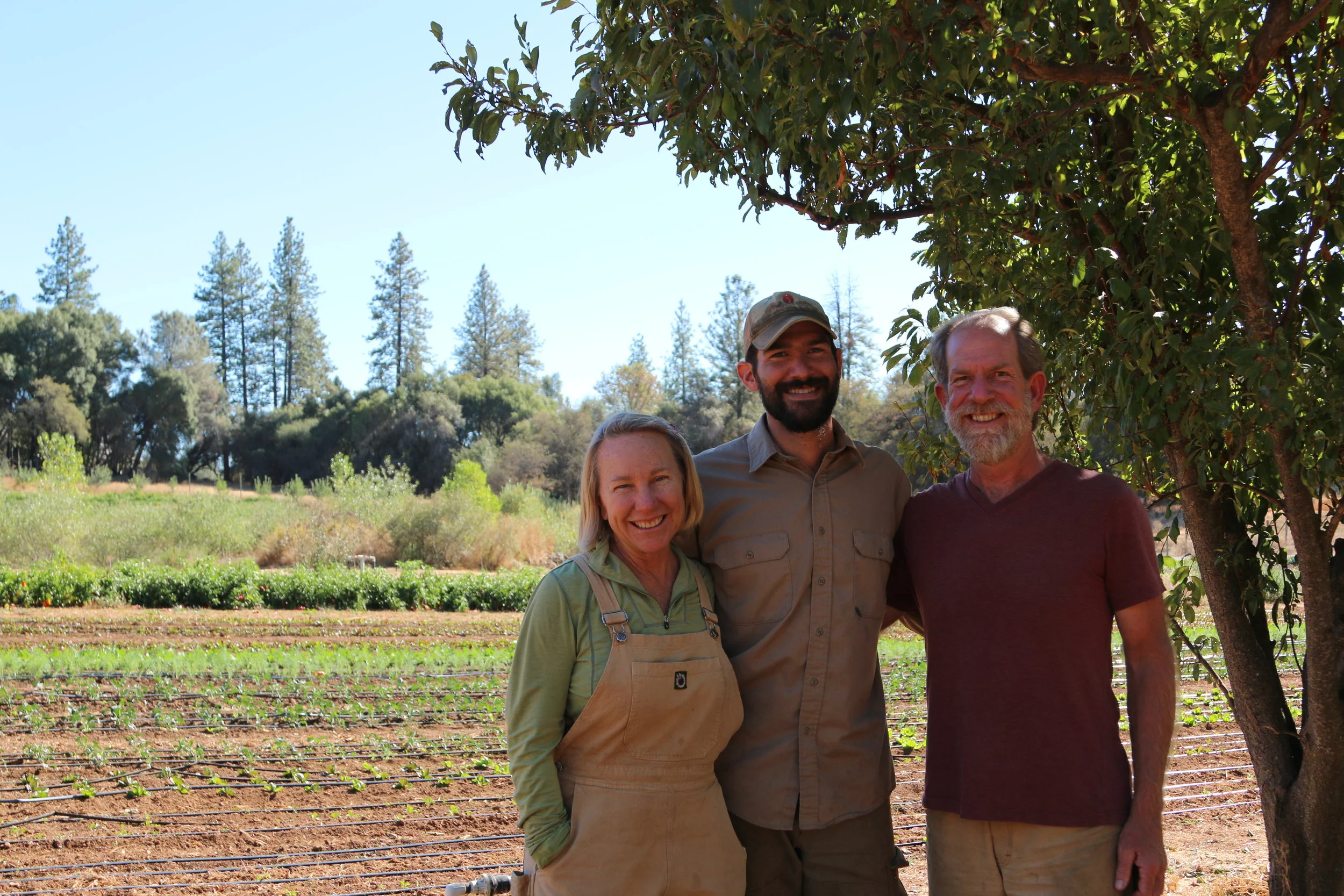We meet Antonio and Alan in the middle of their story, in the middle of transitioning Riverhill Farm. Antonio, “I was attracted to the beauty of the place, the thoughtfulness of Alan and Jo, the quality of the produce, and the community.” As the new operator at Riverhill Farm, Antonio Garza is already showing a deep understanding of what Alan Haight and Jo McProud worked so hard to create.
Together, with the help of California FarmLink, they’ve created a structure for Riverhill’s transition: a well-crafted lease agreement, focused on maintaining the value of the business. But it is mutual respect, an appreciation of the process, and a dedication to do the interpersonal work, that make this transition real.
At age 43, Alan built Riverhill Farm, in Nevada County over the Yuba River canyon, from scratch in 2001, “with the intention of creating a farm that would last beyond my ability to farm—with an eye towards permanence.” When Jo and Alan married in 2007, Jo became an integral part of running the farm. She was in charge of their meticulous books, helped manage their annual whole farm evaluation process and had the coveted job of lead basil harvester.
Today, Riverhill Farm is a thriving farm grounded in robust business planning, a conservation ethic and meaningful relationships with customers. “The value of this diverse organic vegetable and fruit farm is at its absolute peak,” says Alan. “A point of contrast of our story is that many farmers farm until they can’t, physically or mentally. The value of their business goes down while they are working themselves to death, reducing their ability to retire with dignity.”
But after working with Antonio as a farm manager, Alan could really see the possibilities of retirement, “at the age of 61 it became clear that this was an opportunity to step back and do the things I never had the time to do.” He could make the most of his twenty years of hard work building the value of the farm and business.
When Alan first offered Antonio a farm manager position at Riverhill, it met Antonio’s interest and skill set. Antonio spent almost a decade of intentionally building his farming resume at Soil Born Farms, an urban agriculture and education farm outside of Sacramento. Through Soil Born classes and community he met Alan and visited the farm several times over the years. Alan took note. Once it became clear that Antonio was interested in an opportunity for a more permanent situation for himself and his partner Daylin, they started talking about the future in earnest.
They eventually reached out to Liya Schwartzman of California FarmLink to craft a two-year lease. Schwartzman recognizes that these farm transfer plans aren’t easy, and finds that leases are a good tool because, “if you can set up the process so it meets everyone’s needs, that goes a long way.” Alan says, “the two-year lease logic was that, at the end of the two years I wanted there to be a formal pause that would be a transition moment. A moment to say, how’s this working? No one can ever really accurately predict how well someone can run a small farm until they’re actually doing it.”
Antonio and Alan are now in the final year of their initial lease, with the intent to move towards a longer-term agreement. Terms of the current lease include an obligation to maintain sales within 20 percent of 2017 gross receipts and to keep certain primary markets like the local natural foods co-op, two farmers markets and a restaurant. They also have quarterly deep dive meetings. Alan says, “we sit down and review his financials, income and expenses and track those against the previous quarter. Is your economic performance matching where you thought you were going to be?” This lease structure works well for Alan because he’s not financially vulnerable, “If I felt vulnerable, it would require a level of engagement when I was trying to disengage from the farm.”
The lease terms also included all of the infrastructure and all of the equipment, so the barriers to entry were fairly low. But with the lease start date on January 1st, three employees that would come on in the spring, and knowing sales wouldn’t start until May, Antonio pieced together operating loans from California FarmLink and a friend to get him through the critical spring capital needs.
Both Antonio and Alan acknowledge that they’ve chosen the harder path with a mentorship model and there will always be interpersonal challenges. And as Schwartzman puts it, “what Antonio and Alan have done right is to give this process the time it needs.”
Antonio says, “it is not the easiest, but it’s doing important work for both the new farmer and the experienced farmer who is looking to step away. And, working through it and honoring other people’s experiences is powerful and helpful.” His council for aspiring farmers, is that “it’s important to be humble and listen, to learn a lot.”
Antonio and Alan also acknowledge the need for facilitating a better model for farm transfers of the future. As Alan says, “we as a society have to deal with the fact that most farmers cannot retire with dignity, and these are the people who grow our food.” And as Antonio sees the first generation of organic farmers reaching retirement age, he says, “it’s really important work to maintain the soils that have benefited from decades of organic farming practices.”
Whatever the future holds for the land and business, Antonio says that he would hope that Alan and Jo live on the farm as long as they can, “My aspiration is to facilitate an example of the model I would like to see for myself.”

